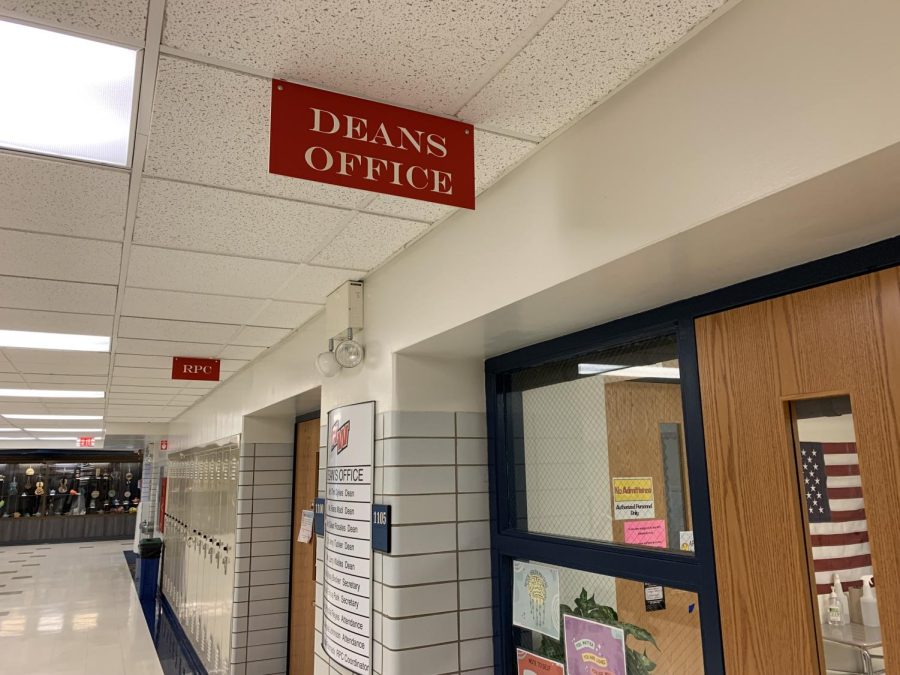Peer Reconciliation Committee: A Positive Outlet for Conflicts
Dean’s office sign.
May 11, 2023
The Peer Reconciliation Committee (PRC) is a student-led club that works to make Niles West a safe and conflict-free environment for all students. According to the club’s pamphlet, the goal of the committee is to serve as a “positive outlet in which students can resolve school-related conflicts with the assistance of their peers and avoid a Dean intervention.”
“Restorative justice” is the principle belief that PRC bases its practices on when negotiating agreements that seek to change negative behavior into positive goals.
“The premise for PRC is to restore the harm that was done, so instead of giving punitive punishments like serving detention, we like the students to give back to the school community. The dean will come in [to a PRC meeting] and explain what happened, the student that did the harm will come in, and then if a teacher or any other staff member was harmed, they will also come in. A big question that we ask is how can the harm that is done be repaired,” school counselor and PRC club sponsor Ann Alegnani said.
While the general methods of the club have been around Niles West for a while, the club was recently updated to be more relevant and to utilize restorative practices.
“PRC came out of peer mediation that has been around Niles West for probably over 20 years. About eight years ago, we revamped the program with the social worker that was previously here and the students that were on the first committee chose the name,” Alegnani said.
A natural concern that may arise in a club involving students discussing their personal business in front of a committee of other students is confidentiality. However, from Dean Amy Tucker’s experience, she has never encountered a confidentiality leak with PRC.
“All of our students that are involved in peer reconciliation go through training and the confidentiality piece is a big part of the training. Parents and guardians also have to give their permission for their students that are facilitating or coming before the committee to be involved in peer reconciliation,” Alegnani said.
The majority of the issues brought to the committee revolve around classroom behavior and minor issues. However, more personal matters stay between the student and the dean and are not brought before the committee.
“The only things we don’t refer to the PRC are things that we should not be putting in front of other students, like if it is something super personal or very serious things like a fight or something having to do with hate speech. Typically things we refer to the PRC are minor theft, disruptions in classrooms, disrespect to an adult, forgery [in terms of signing a teacher’s name on a pass], and minor things like that,” Tucker said.
All of PRC’s referrals come from the dean’s office and the frequency of the committee’s meetings depends on how many referrals they receive from the deans, which is usually between two to three per week according to Alegnani.
“There’s never a set schedule. If something comes up they’ll send out an email and if anyone’s available during a certain period, the first three people that respond with yes get assigned to it,” senior and club member Maria Tudose said.
PRC can be beneficial for students because rather than looking at them subjectively based on one issue, it takes a more holistic approach and judges the student as a whole.
“Very recently, a student was in there for a minor disruption in the classroom. When they started digging a little bit deeper into talking to the student, [they found that] that student was struggling in a few classes. Part of the outcome was to repair the harm to the teacher, but they were also expected to go to the lit center two times a week until the end of the school year because they were trying to address that academic piece as well. I think they’re doing a really good job at looking at the whole student and not just that particular situation,” Tucker said. “Every year the kids surprise me with how creative they are with their consequences. I’m a firm believer in logical consequences; the punishment should fit the crime.”
Students negotiate the terms of how they restore justice with committee members during their meetings.
“They [students who have been referred to the committee] usually agree to do the Go Green Club or the West Helps Others Club so they can give back to the school as restorative justice,” Tudose said.
While there is no exact data, PRC seems to be an effective way to prevent negative behavior from repeating itself.
“I can’t think of too many repeat offenders from the peer reconciliation committee. We’ve been doing this for at least seven years and over those seven years I can’t think of more than a couple where it didn’t work,” Tucker said.
The club is currently made up of about ten students but club sponsors would like to increase the size to about 20 to 25 students and are recruiting new members for the 2023-2024 school year. Students can apply by filling out the application included in Susan Johnson’s email on April 19, 2022 and returning it to the Guidance Office or to [email protected].




